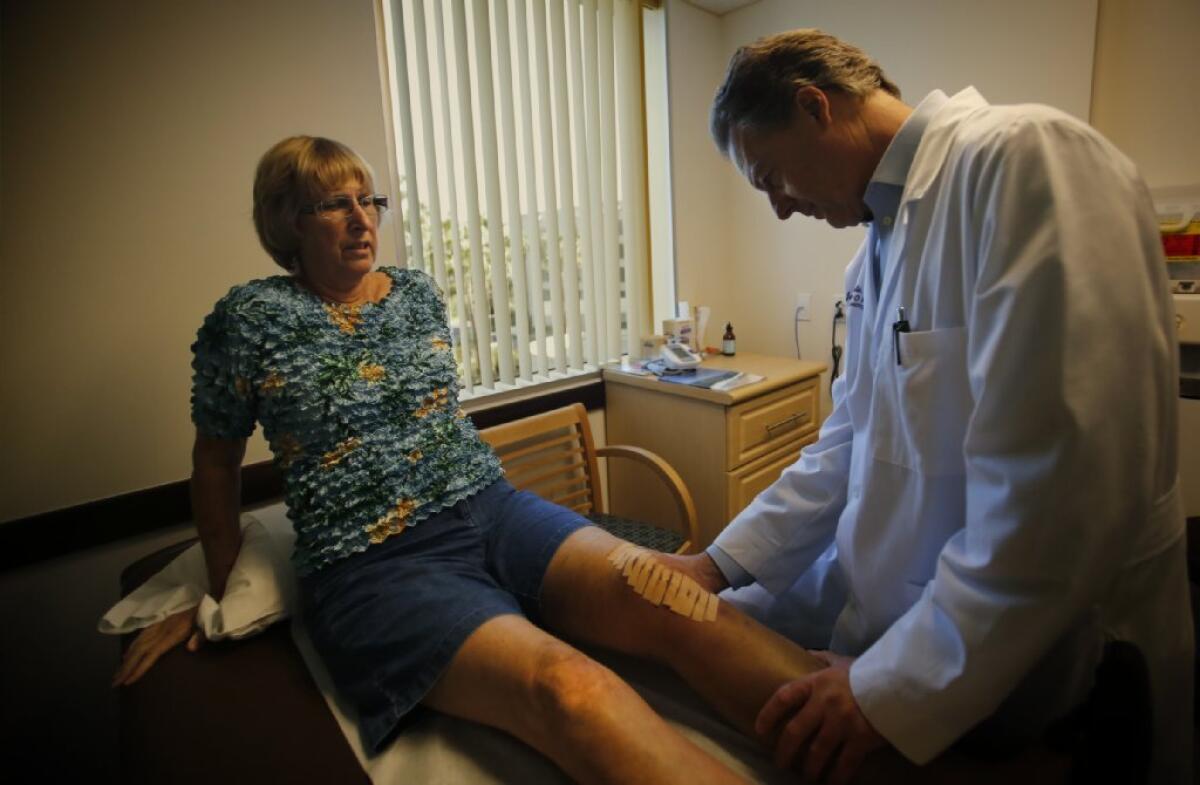Medicare plans big payment changes for knee and hip replacements

Orthopedic surgeon James Caillouette examines Carolyn Rondou after her knee replacement surgery at Hoag Orthopedic Institute in Irvine last year. Caillouette and the hospital have been big proponents of bundled payments.
Federal officials want to change how Medicare pays for hip and knee replacement surgeries at hospitals across the country.
The Obama administration is proposing bundled payments for these common joint replacements that inject more financial risk, and reward, for participating hospitals.
The new program could start in January in 75 markets around the U.S., including Los Angeles, Long Beach and Anaheim in Southern California. Overall, the new rules would affect more than 800 hospitals in large and small cities.
Knee and hip replacements are two of the most common procedures for Medicare patients and cost the federal program more than $7 billion for hospitalization alone in 2013.
The proposed program would apply to about a quarter of the 400,000 knee and hip replacement surgeries performed annually on Medicare patients.
“We are committed to changing our healthcare system to pay for quality over quantity so that we spend our dollars more wisely and improve care for patients,” said Health and Human Services Secretary Sylvia Burwell.
Officials said the rate of complications, such as infections or implant failures, can be three times higher at some facilities than others. That can boost the odds of a costly readmission.
The average Medicare payout for surgery, hospitalization and recovery ranges from $16,500 to $33,000 across the country, according to government figures.
This proposal is taking aim at those variations and trying to move away from the conventional fee-for-service Medicare system where hospitals and doctors get paid for every procedure they perform, regardless of how patients fare.
Many consumer advocates applauded the government’s move, but some industry groups urged caution.
“This kind of innovation is a positive and promising step toward a healthcare system that rewards value instead of volume,” said Debra L. Ness, president of the National Partnership for Women & Families.
Blair Childs, a senior vice president at Premier Inc., a healthcare purchasing and consulting group, said the proposed rule “is too much, too fast” since it requires hospitals in 75 markets to participate.
“A voluntary, national program would ensure that only providers who are ready to take on this challenge enter the program, avoiding unintended consequences,” Childs said.
Federal officials are taking comments on their proposal through early September.
Under the government’s plan, hospitals would receive a bundled amount covering the surgery and any related care 90 days after discharge.
The hospital might receive an additional payment or be required to repay Medicare for some costs depending on the hospital’s performance on various measures.
Some doctors, hospitals and large employers have already forged ahead with this idea of bundled payments for heart, spine and transplant surgeries. Under such plans, employers will fly workers at no cost to top-performing hospitals offering all-inclusive prices.
The California Public Employees’ Retirement System, one of the nation’s biggest healthcare purchasers, adopted a similar idea called reference pricing for joint replacement surgeries.
The giant pension fund limited what it would pay for knee and hip surgeries to $30,000 after finding that its hospital bills ranged from $15,000 to $110,000 with no discernible difference in quality. The program saved CalPERS more than $5 million over a two-year period.
Twitter: @chadterhune
ALSO:
Obamacare cash fuels healthcare merger mania
Obamacare chief in California gets $65,000 bonus on top of two raises
Doctors, hospitals get $6.5 billion from drug, medical device firms last year
More to Read
Inside the business of entertainment
The Wide Shot brings you news, analysis and insights on everything from streaming wars to production — and what it all means for the future.
You may occasionally receive promotional content from the Los Angeles Times.











